On giving and receiving compliments
A.K.A. It's a trap!
(30-35 min jaunt)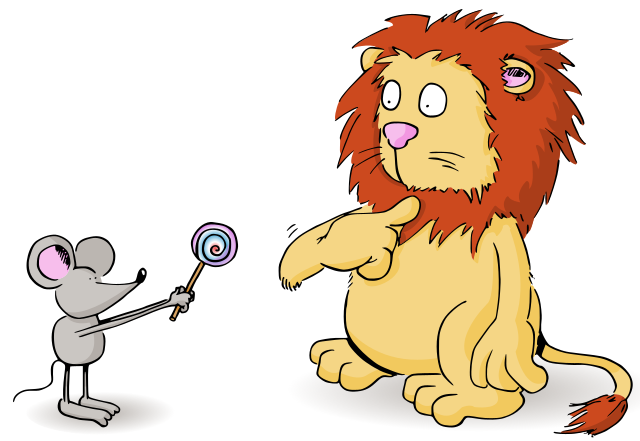
“Hey, that’s an awesome T-Shirt you have”
“Oh! Um… thank you.”
And thus both parties’ days have just been enriched that little bit further.
It’s never as easy as that though, isn’t it? On the surface, compliments appear to be a no-brainer. They are free and make people feel cool about themselves. Why not spread more of them around? That’s what we’re told, anyway. But despite this, compliments not only appear to be in short supply, but people can also get weird around them. To understand why it is such a minefield, I need to send you a Christmas card1.

You wake up to find a card on your doormat, wishing you wonderful holidays. You have never met this person before, but you do have their return address. What do you do?

Well, if you happened to be living in Chicago in the winter of 1976, the answer is that roughly 20% of you would send a Christmas card back to the sender2 (as in, a new one, not passive-aggressively returning their own letter, funny as that would be). For those who have ever tried online dating, a 20% response rate isn’t too shabby for complete strangers3. Especially considering that this was the 70’s, so a reply required you to write a little more than “k thx” and then go find a real postbox. This doesn’t entirely make a lot of sense, however, in the world of selfish genes and zero-sum games4. There is little-to-no gain to be had by sending a Christmas card back. You’ve never met this person and possibly won’t, so why reply at all?5
Whilst some might claim that this is the “true meaning of Christmas” in action, it also goes by a slightly less magical name: “The Law of Reciprocity”. I know, I know, I don’t expect it to feature in any heart-warming Christmas movies either. In effect though, it states that if someone does something good or bad for someone else, then the other person will feel compelled to return the favour (whether they act upon this impulse is another matter entirely). It’s why 20% of people sent a Christmas card and is also why my flatmate went to Paris.
Everyone in the flat converged into the room to a remarkable sight. My flatmate’s bed and desk were littered with a terrifying assortment of goodies. He had everything from aftershave, an entirely new gaming console (plus games) and a freaky-looking back massager which you mounted onto your chair. It was his birthday and his girlfriend had gone all-out. To the tune of £500-700, to be specific. Bear in mind that this was university and we received around £1300 in student loan per term to encourage us to subsist on more than baked beans. Our friend’s partner had thus blown somewhere in the region of 40-60% of this in one outing.
The funny thing though, was that our friend wasn’t wearing the expression of a young child at Christmas day, elated at the confetti of gifts which had been rained down upon him. No, his expression was one of dread. And it wasn’t just him. The whole flat, in an uncharacteristic moment of silence, shared in the concern. We were all thinking the same thing.
He was totally screwed.
Why? The bar had now been set. He wouldn’t make it to the other side of his partner’s birthday with his face intact if he continued their previous trend of a £20 chicken dinner; not when she had just spent over £500 on his birthday. Without a word, his “gift” had arrived with a sneaky little contract: He now had to do the same for her.
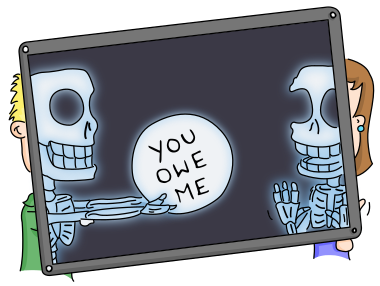
Of course, he could always just return the gifts, right? Hand back £500-worth of presents and say “hey, I really appreciate the sentiment, but I don’t think it’s fair to expect you to spend so much money on me like this”.
For those of you who have pulled this off, and lived, you are either immeasurably brave or have very mature relationships. The above paragraph probably made most of us squirm, however. Have we ever stopped to think about why, though? Why, when a person receives something they neither asked for nor wanted, are they obliged to appreciate it? Why is returning a gift tantamount to a slap in the face?
This is the darker side of the Law of Reciprocity: It is mutual. Whilst the recipient may feel compelled to return a favour, the giver may equally feel compelled to expect one back.

My friend wasn’t given an ultimatum – at least directly. His birthday card didn’t say “if you don’t spend this much on me, I shall relieve you of your testes. Love you. Kisses”. Yet everybody present all somehow saw this lovingly spelled out in front of them in a pile of needless tut (is now an appropriate time to mention that my friend neither cared for gaming consoles nor auto-back massagers?). We all somehow knew of the same unwritten code of conduct: If people do nice things to you, to not do so back is rude. Declining a gift is also rude.
And it is this, which is where our complimentary minefield begins. You might think “but hang on, what have Christmas cards and birthday presents got to do with compliments?”. The important distinction here is that they all fall under the same umbrella: Gifts. The fact that a compliment is free (at least in a financial sense) and has no physical form does not exclude it from this category. If we think about compliments as gifts, its weird nuances should start to make a bit more sense.
If you work in a big industry (particularly heavily-regulated ones), you might be familiar with the concept of a “gifts policy”. If a customer brings me a bottle of wine because of something awesome I did other day, I’m fine. But if I’m offered an all-expenses golf holiday on a private island, I have to refuse. On the surface, this may appear mean-spirited. A gift is a good-will gesture. Why would a company regulate what nice things its staff can receive?
Contrary to what most of its staff might think: Companies aren’t completely naïve. Winning a free all-expenses holiday might not set off any alarm bells, but what if this holiday happened to come from a salesperson from another company? And guess what, this is a company that I just so happen to be negotiating a very important contract with. By now, we’ve all likely clocked on. Thanks to the law of reciprocity: Free gifts are seldom free. People (knowingly or otherwise) often give things to others in the hope of setting off their desire to give something back. “Hey, let me scratch your back… and now that we’re friends, how about you scratch mine?”

The lab boys have had their fun exploring this. When a waiter brought out a plate of sweets at the end of the meal, they received roughly 14% more in tips than when they did not. Then they made a really interesting adjustment. The waiter would bring out a smaller plate of sweets and then, as they started walking away, would reach into their pocket and add another sweet to the dish. That extra sweet conferred them 21% more in tips than the control. Bear in mind that the total number of sweets was the same as the 14% test. The only difference was that the extras were added in front of the customers. In other words: The very act of a waiter implying “you know what, you guys are cool. Here’s a little something extra” caused them to receive 9% more in tips than if they had just brought out the same number of sweets in the first place6. In another study, participants were asked to rate art in the same room as another subject (secretly one of the researchers) who purchased some of them a drink part-way through7. Additionally, this researcher would sometimes be pleasant and likeable, and other times not. When they asked the participant to purchase raffle tickets later, it was whether they purchased them a drink which had the greatest effect (an average of 1.73 tickets vs 0.92) rather than whether they were particularly pleasant or not (1.41 vs 1.1)8.
Unfortunately, the damage isn’t limited to people having crumpled raffle tickets gathering dust in their wallets. Many women (by the time they reach mid-20’s I’d say) have probably seen, first-hand, a nastier side of this too. Receiving attention or a compliment at the bar might seem flattering at first. A guy thinks she looks nice. How cool! She thanks him. He asks her out. He’s not her type though, so she declines. How do guys respond to this? Not very well, apparently. Generally it goes to the tune of “Oh so you think you’re too good for me huh? Yeah, well I never liked you anyway you ungrateful, selfish <insert flattering term here>”. Apparently, accepting a guy’s compliment without sucking him off is “rude”.
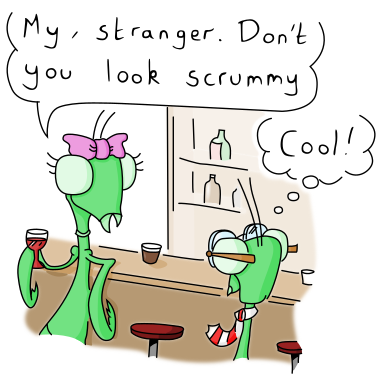
In a slightly less faith-in-humanity-eroding scenario, I once received a scolding all over – coincidentally - a Christmas card.
I was 9. I’d drafted the list of the friends I was making Christmas cards for and spent a number of evenings drawing customised cartoons in each, as I wanted the cards to be awesome9. As I handed these out in school, one of the other kids started having a go at me. They gave me a card, why didn’t they get a super-customised one like my friends did? Despite barely speaking to me for the rest of the year, the act of scrawling my name in a card gave them the notion that they were entitled to one back. They were not the only one, however. Despite being confident in my decision and its rationale, I, too, was keenly aware that I was defying an unwritten social norm of sorts. I still had some kind of mental “tug” that I did not at the time understand but had consciously chosen to disobey.
Though a compliment might not have a monetary value, it does not change the fact that it is still a gift. And therein lies the problem. In the same way that people may insincerely use money, niceties or favours for their own personal gain… so, too, may they use compliments.
Which means, if people are cautious around gifts… So, too, will they be cautious around compliments. Worse, if they have come to expect that there is always a catch, they may even start putting down the shutters entirely and stop perceiving compliments as sincere in the first place. Even if you are nice, they might not believe you anyway.
This is precisely why, despite being free, despite being wonderful, they are so damn messy.
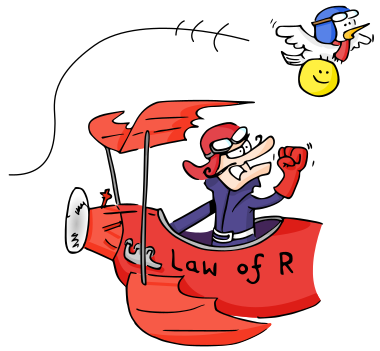
On giving compliments
The reason I mentioned all of the above was because, curiously, the majority of the tricks and tips I have stumbled upon when it comes to giving and receiving compliments achieve the same thing: Bypassing or silencing the Law of Reciprocity. Finding ways to enable people to relax and actually absorb a pleasant remark without a hidden contract tugging at their sleeves. Shall we?

1. Make it a habit
Let’s get this out of the way now: The first compliment will likely be awkward as heck. There isn’t really an easy way around this. If your recipient is cynical of Colgate-smiles and bum-kissing schmoozing, even a genuine compliment will probably confuse them. Equally so if you’ve known each other for a long time and compliments haven’t particularly featured. Try as you might, an unusual change in behaviour will look… well… unusual.

And you know what, that’s fine. To me, one of the key elements is that it’s not about making every compliment land perfectly, but simply making them consistent. I’ve found that the occasional people who have remarked that I am ‘supportive’ or ‘encouraging’ are not those to whom I have given particularly ground-breaking compliments to… but simply those who happened to receive regular and appropriate encouragement. Put another way, I was surprised to see that lots of little compliments were better received than one huge-ass humdinger. And for good reason: Consistency appears to be a more reliable sign of sincerity than how magnanimous or flattering your words are. Sometimes, the only way you can best the Law of Reciprocity is to build trust. Repeated examples of being nice without demanding repayment.
So don’t sweat it too much if you’re met with a confused thank you. Compliments are a long game. Some people take time to come out of their shells, and trying to go for bigger and showy praise may actually discourage it. As long as subsequent compliments (as in, over days/weeks, not a single conversation) remain sincere, it’ll encourage the recipient to believe that you mean what you say – and, heck, maybe even appreciate it.

2. Be consistent
Also known as “be careful about raising the bar”.
Complacency is, to me, one of the biggest barriers of compliments. I will often see a first effort lauded, but subsequent ones ignored where it now falls under “expected behaviour” and thus no longer worthy of praise.
It’s this, I believe, which is where the feeling of not being valued sneaks into workplaces and relationships. What was once regarded with gratitude becomes “but that’s what you’re supposed to do anyway, no?” A partner lovingly creating a meal is slowly regarded their evening duty. An employee creating consistently strong outputs is slowly regarded as what they were hired for in the first place.
One of my little rules for this is: “If it’s good enough, it’s worth a thank you”. You don’t always have to be blown over and astounded in order to compliment someone.

3. Don’t compliment crap
Bear in mind, however, that being consistent with your compliments does not mean that you should compliment nothing.
Really good compliments come from a place of genuine appreciation. The reason it tends to shut up the Law of Reciprocity is because it says: “You owe me nothing because, as far as I’m concerned, I’m the one who owes you. Please accept this appreciation.” – In other words, when the recipient perceives that they have earned a compliment, they are less likely to question its origins.

Thus, a quick way to sabotage a compliment is to make it baseless. If you dole out the exact same line regardless of what happens, your words will fall into the category of “just being nice”. Don’t get me wrong, fluffy pleasantries are better than being a jerk. But have you ever seen those relationships where one person keeps telling their partner “oh you’re so gorgeous” nonstop? The curious thing is that, whilst appreciated on the surface, have you ever noticed that the recipient starts to almost tune it out? They will ignore their partner’s words whilst they obsess over not looking perfect.
It’s disheartening to see, but where I feel that compliments for the sake of compliments backfire horribly. It should hardly be surprising that people who say things for the sake of being nice have their pleasantries dismissed as “you’re just being nice”.
Remember, consistency does not mean constantly. To compliment generously is not to be without critique.

4. The “thank you” add
A nifty in-road is, quite simply, to build upon a thank you.
“Thank you, this looks amazing.”
“Thank you for getting that task completed. You’re picking this up quickly.”
“Thank you for dinner, I really love your cooking.”
Thanking someone is showing appreciation for something they did. You are, in effect, repaying them with gratitude for a debt you owe. Say… haven’t we been here before?

By tacking a compliment onto a thank you, you are bundling your appreciation with an already expected sign of appreciation. Compliments that come out of nowhere can be seen as suspicious because it’s seen as a gift which the other person may be expected to repay in some way. Here, however, it is reversed. The gift was the nice thing which the other person did, and the compliment now becomes part of your “repayment”.
Think of it this way. If I walk up to someone and say “here’s a fiver”, they may (understandably) wonder what the catch is. If, however, they have helped me with something and I say “hey, thanks for your help! Here’s a fiver” it’s less of an issue. Why? My gift now has clear a reason. By adding a compliment onto a thank you, the reason for your compliment also becomes clear.
Of course, you do not always get the opportunity to thank people for something you’d also like the compliment them for. You can’t exactly go “oh hey, thank you for looking presentable tonight. Did I mention I like your hair?”
This is where it tends to require a little more finesse. Sadly there’s less of a single approach to take, but more a collection of nuances which, if combined, can stack things a little more in your favour.

5. Compliment what people do, not who they are
I’m going to give you a freebie. Better still, I’m going to let you choose it. Out of the two compliments below, simply pick the one you’d like to receive:
“Congrats. You won because you well and truly outplayed me.”
“Congrats. You won because you were lucky.”
Hopefully you picked the first one. I briefly touched upon this in Point #7 of Being assertive without being a jerk (Separate the person from the action), and this approach appears to apply to compliments too.
What I mean is to shy away from broader statements like “you are so awesome / cool / beautiful”. It’s not that these are bad, but if a compliment appears too vague or even baseless, they become very easy to dismiss or ignore. I may be wrong, but I think what this comes down to how much control the person has over what you are complimenting them on.
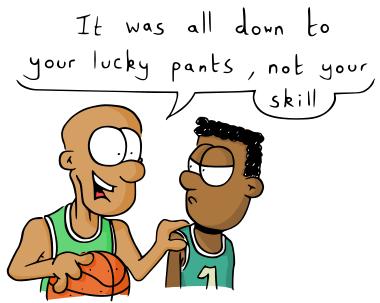
The reason why being told that you were lucky tends to be a really naff compliment is because you cannot really do much about luck. There’s not really a lot you can do to sway a dice roll in your favour (other than perhaps chanting or not washing your underwear) so it’s not really an achievement, is it? You’re not being complimented on anything you did, but merely where you happened to find yourself.
Suppose, then, I told someone “whoa, your eyes are so pretty”. This may be flattering at first, but they didn’t necessarily choose to look that way either. The way their eyes look are predominantly how their parent’s reproductive cells happened to smash together10, rarely through a conscious decision on their part. Here, the recipient doesn’t really get to enjoy feeling like they have done something right… but simply that they had a lucky roll of the dice.
On the other hand, if a colleague says to me “hey, is that a new shirt? It really looks nice on you”. I’ve made a conscious decision to wear that shirt. Not necessarily to look good, but it’s still a decision I have made, and one that is being recognised.
There are even wider, practical applications to this, too. Following a test where the results were fudged and all students given the same results, one group of school kids were told “wow, you must be really smart” and another “wow, you must have worked really hard for this”. The kicker is what happened when these students were allowed to choose between easier or tougher tests: Only 33% of the “you must be smart” kids opted for the harder test compared to 92% of the “effort group”... and even 50% of a control who received no compliment at all. Not only that, but the “you must be smart” group scored worse on a later test after facing failure and reported less inclination to persevere with the questions than both other groups – who also scored higher. Curiously, the compliments on their innate abilities appeared to damage their perseverance in the face of any setback.11
Whilst the exact reasons for this are unclear, we can come back our theory of control. If someone is told “you are smart”, it implies that the only reason they are smart is because they happen to be born that way, not through any effort they put in. This means that when they come into a scenario where they are not smart… they may conclude “well I clearly am not good enough” and stop. After all, if their intelligence is simply something you have or don’t have, then no amount of effort will change that12.
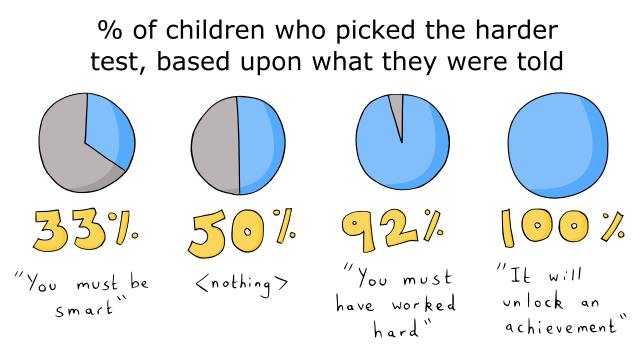
It’s also this, I believe, which keeps the anti-ageing products flying off the shelves as well. A person raised on a diet of “oh you’re so stunning. You look like a super model” gets to enjoy their feeling of self-worth coming from how they happen to look. What do you suppose, then, happens when age starts to change it? Do they accept it gracefully or lose their marbles and slap products on their faces in a desperate bid to pretend that nothing is happening?
To me, complimenting a person on something they did has a considerably greater impact because it fundamentally says: “I really appreciate the effort and choices you have chosen to make” as opposed to “you’re so lucky”. Therefore, look for things that people have had some kind of control over, when going to compliment them:
“I’m amazed how you have learned to hit the high notes like that”
“Have you done something with your hair? It looks really nice”
“Your work is really fun to read. I like the witty dialogue between the characters”

6. Beware “I dub thee….”
Some people just can’t give a compliment without trying to elicit a sense of superiority in the process. I’m talking about things like:
“As someone who is a master black-belt and has won many competitions in my time… I must concede that your skills are acceptable.”
Of course, this is a rather caricatured example. Most people don’t speak like that13. The gist, however, are compliments presented in such a way where the recipient is expected feel honoured by it. It’s taking “compliment something meaningful” too far in the other direction, to the extent of almost proclaiming: “You have earned my favour. I shall award you my blessing”. The merit is no longer on what they did, but more that they managed to impress someone.
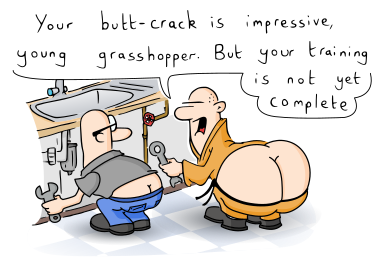
Don’t get me wrong, this can work but only when other people buy into the idea that the giver is as great as they imply. At that point, they do indeed go nuts / cry - see any TV competition ever. The problem, however, is if they don’t buy into this. At that point, the giver simply looks like a pretty obnoxious prat. So use carefully (personally I’d say never), as it can backfire.
Whilst it’s a subtle one to pinpoint, a few handy pitfalls worth avoiding are:
- Don’t speak of your own achievements when complimenting someone else’s.
- Unless it’s a funny, mutual in-joke: Don’t dwell upon whether a person was rubbish / you didn’t like them previously. The “I was worried about you initially, but I see that you have come a really long way”. In these cases the better option is simply to go with “You have come a really long way”.
- Don’t purposefully withhold a compliment until you’re in front of a crowd.
- Be careful when suggesting improvements that they do not cancel-out the compliment, otherwise it can come across a bit “This is good, but your training is not yet complete”. A better example is something like “your playing style is excellent, but the audio quality makes it harder to hear”, as the latter point does not counter the former.

7. The fly-by compliment
Imagine I swing by your desk and give you a cake. Assuming you like cake, you’d probably thank me and look forward to enjoying it with your morning coffee. What if, however, I perch myself on the end of your desk and insist on watching you eat it? Mmm. Still enjoying that cake?
Though a creepy example (and hopefully not one you'll ever see): This is how compliments can land when they are the defining element of a discussion. If I tell someone “wow, you are amazing!” and then stand there expectantly, waiting for them to respond – I am now being the cake-eating-voyeur.
Equally, some scenarios will always be quite tough where there may be a ton of suspicion to work through. For example, if a guy wanted to a compliment a woman’s outfit or a colleague wanted to compliment a superior. These come with a lot of presumed motives, so navigating them can be hard. You can deploy your compliment but your recipient may find themselves thinking “how am I supposed to respond here? Is it even safe to accept this compliment?”
In these instances, a “fly-by compliment” can be very useful.
The approach is simple: Drop your compliment and then carry on with whatever it was you were doing. Don’t leave room for a response. If you were talking about something else, carry on with that. If you were walking by, keep walking.
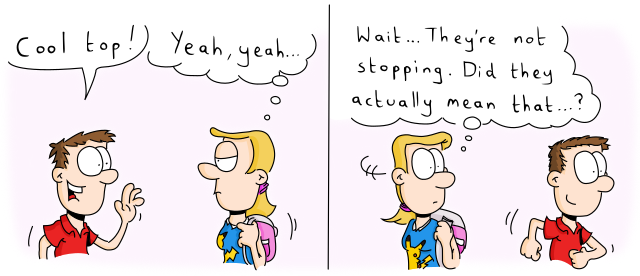
Though this may sound a little odd, there is a purpose: It’s hard to be pulled into thinking “this person wants something in return” if they don’t actually stick around to expect it. By making it clear that you are not looking for anything (even a response), it allows the recipient to believe that the compliment was indeed genuine.
I unwittingly had this used on me at work, many years ago. My colleague was discussing general plans and strategies and, mid-sentence, threw in something like “I know this bit will be safe in your hands as you have an excellent eye for these things” and then – here’s the kicker – kept talking about the plan.
He wasn’t normally one for compliments, and what really caught me off guard was that he wasn’t looking for anything in return for it. There was no “I want you to accept this” (as per point #6: Beware "I dub thee..."). Though the approach was unusual, it was also what made it so effective: With no red flags I was able to genuinely feel good about what he said.
The silent expectation that a compliment needs to be responded to is what can often make it feel awkward. By taking this bit away, however, you allow the recipient to digest and enjoy the compliment in their own time – free from any expectations. Though this may appear flippant if used excessively, I find it is an excellent way to get the ball rolling. If other people are not used to you giving compliments (or the scenario is quite fraught), it’s a nice way to work around it.
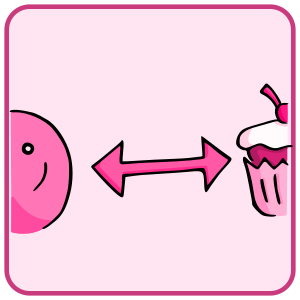
8. Keep compliments and favours far apart from each other
Another way to harm the sincerity in your compliments is to use them when you want to ask for something. Laying down a red carpet of flattery may work for the hideously insecure, but more clued up individuals will quickly become suspicious each time you rock up with pleasantries.
The easiest way to remedy this is, quite simply, never combine the two in the same discussion. By keeping them separate, you help to ensure that your compliments aren’t perceived as a means of buttering people up. Again, it simply plays into the habit of compliments being seen as genuine appreciations for things. The more that people see that your compliments are just that, the more they can start to believe it.
The exception to this is if the compliment is both concise and directly links to why you’re asking in the first place. For example:
“Hey, I understand you’re quite experienced in these kind of problems. Do you have a few minutes for me to run this by you, please?”
“You seem like a lot of fun, I’d love to meet up if you’re interested?”
The key here is that the compliment isn’t the main focus of the question. It more feeds into the reasoning of why you’re troubling the person with the request in the first place. It’s adding context, rather than trying to flatter.

9. You don’t need to fawn
A compliment can be specific (such as the facial expressions in their art), but it doesn’t always have to be detailed.
I really feel that people overcomplicate compliments, believing that it always has to be moving and grand. It really doesn’t. One-liners like “Awesome work”, “Cool shoes” or “Nice hat” can just as equally be a boon to someone’s day14. In fact, until people are more comfortable around your compliments, it’s sometimes even better to start small. If you find yourself stuck for words or are worried you’d look like you’re gushing, keep it simple. There are times when a longer, heartfelt compliment lends itself to the situation, but don’t feel you must have one in order to proceed.
A follow-on from this, a pretty useful rule of thumb is that once your compliment has been received and/or thanked: Don’t try and follow it up with even more compliments. The more you egg it, the more it can risk being seen as digging for something.

10. Don’t wait up
Why wait for an annual review or anniversary to tell someone that they are appreciated? Screw that.

11. Beware sandwiches
A common trick I’ve heard on giving criticism is to sandwich it between praise. Soften the blow by telling someone how great they are before you tell them how much of an idiot they also are.
Whilst I can appreciate the approach of not just dishing out scathing critique… it needs to be used with care. If the only times you are giving compliments is when you are also scolding, your compliments will risk turning into warning signs. Much like keeping compliments and favours separate, you don’t want every compliment being accompanied with a complaint either.
That’s not to say you can never use the above method… it’s more that you should ensure that you also give just compliments too. If you want a rule of thumb: I’d aim for at least half of your compliments to come without critique. Granted this number is more a work-specific scenario. In personal relationships, I’d even aim for considerably higher, like 80%.

12. Do not undermine your compliments with your actions
Compliments almost never happen in isolation. The act of giving a compliment doesn’t immediately make it complimentary or meaningful. What you do before or afterwards can also make or break it.
A common example at work is if a team had to bust a gut and work weekends in order to get a project over the line – due to preventable issues such as overly-optimistic timelines. The team may receive a nice e-mail saying “we really appreciate that everyone had to go above and beyond to get this over the line. Great job everyone” only for the next project to go the exact same way with the exact same problems. Despite receiving gratitude each time, teams will very quickly numb themselves to this lip service.
This is the delicate balance of compliments and appreciation. People may read into what you are specifically appreciating them for… and derive important conclusions from it.

In the above example, the reason people get fed up of those e-mails is because they insinuate that the company only appreciates the fact that the team are willing to pick up the slack when other people screw up. This is because they perceive the company as making little-to-no visible effort to prevent the same situation happening again. “Thank you for going above and beyond” is read as “We like the fact that we can get free extra work out of you. It makes our lives easier”.
Contrast this to companies who, instead, say “we really appreciate that everyone had to go above and beyond, which is why you’re all getting Friday afternoon off.” – Their action is showing that they appreciate the problems they caused, and are thus attempting to compensate it.
This is why parents have crappy macaroni houses on their fridges. If you just took your child’s work and said “oh that’s great sweetie” then stuffed it in the bin… they’re not exactly going to believe you.
When people want to know if your compliment is sincere, what they will look for is your actions. If your actions betray your compliment, they will perceive it as insincere. Whilst it might sound a bit obvious to say “giving compliments is more than just saying nice things”, it is a surprisingly common trap.
… and receiving them

1. “Oh! Thank you.”
I have found a pleasantly surprised thank you to be one of the most reliable ways to accept a compliment (and smile. For goodness sake, smile). Words to this effect, such as “I really appreciate it, thank you”, all tend to work pretty well.
It is a very simple response which acknowledges the compliment without making a big deal out of it. If you try and run with the compliment with things like “why yes, I was awesome, wasn’t I?” you risk looking like a bit of a jerk. Equally, even if you don’t necessarily believe them, it’s not worth trying to play it down or brush it aside. Doing so can make you a bit of a buzzkill or, worse, look like you’re moping in order to fish for more compliments. There’s no victory to be had in playing a martyr. It’s not like the giver can return the compliment and get their money back… so just keep the damn thing.
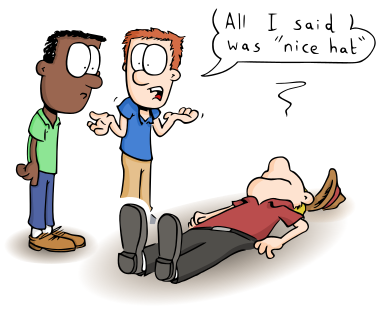
As for the ‘pleasantly surprised’ bit… it’s not that you need to feign shock. You don’t need to clasp your face and shout “NO FREAKING WAY!” but more that you don’t want to sound like you have been impatiently waiting for it with a “Thank you! I’m glad someone finally realised it.”
Of course, don’t feel like you’re limited to a one-liner. By all means elaborate your response if you see fit. For example, if you receive:
“Ah I really love that song. The hook is so catchy.”
You may want to say:
“Thank you! I confess, I stayed up all night trying to perfect that hook, so I’m really glad that it’s appreciated.”
Stories like this can make a response warmer or more personalised. But that’s icing. The most important element is the baseline of the “thank you”.

2. (Where appropriate) “Couldn’t have done it without you”
“Hey, great work out there!”
“Ah, it was all you, dude!”
This exchange probably looks a little trite, like a really naff scene between chivalrous knights. “Oh please, this compliment must be yours. I insist”. “No, I insist. For you are the greater”, where you have to pretend that you did nothing and everyone else is amazing. And you would be right. In many circumstances, compliment hot-potato is trite. There is, however, a specific time and a place when this is very important.

If a victory is shared, but only a few people are given the praise: All eyes will be on what they do with it. Will they share the spoils or keep the lot?
In this instance, the above suddenly becomes valuable social currency. A person who is willing to ensure that their colleagues are given the appropriate recognition will be regarded more warmly than someone who takes all of the credit.
Don’t get me wrong, this isn’t an Oscar acceptance speech. If someone likes your work, you don’t have to tearfully credit your third grade teacher for getting you to stop eating play dough. If someone likes what you do, by all means take credit for it. You just need to be able to discern between when you are complimented for your contribution to a larger event (“it was a great team effort out there, but I particularly liked your supporting of the defenders”)… and incorrectly giving you the full credit for it (“you made the game there”), the latter of which is where it’s fairer to share the compliments out.
All this simply comes down to is: Don’t hog a compliment that isn’t entirely yours.

3. And that’s it
Honestly, there isn’t much more to receiving compliments than that. To me, the appropriate response to a compliment is simply to receive it with gratitude. Nothing else. That’s all you need (at most) to, shall we say “square the deal” and pay any debt that the Law of Reciprocity would attempt to impose. It’s important not to get suckered into feeling like you are now in debt to a person who says something nice about you.
Being guilted into feeling like you have to give back compliments or favours is, at best, unhealthy and can even be hallmarks of toxic relationships. If people try to play compliments as bargaining chips for anything more than a simple thank you, they are the ones in the wrong. Not you.

The only thing a sincere compliment wants to know is that it landed (if that). The point of a sincere compliment is that it is an appreciation of something which you have done or are doing. In other words, you have already earned them.
My only ask is that you help hand out more to other deserving individuals. You don’t have to be magnanimous. You don’t have to make it public. You don’t have to pretend that something isn’t crap when it totally is.
But if a job you wanted is good enough, it is at least worth a thank you, in my eyes.



 Squid and Whimsy
Squid and Whimsy

